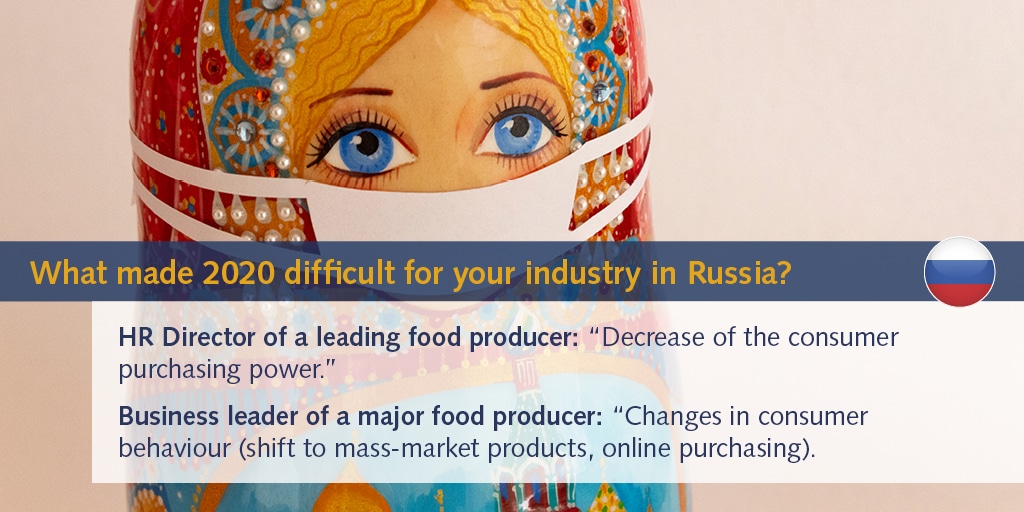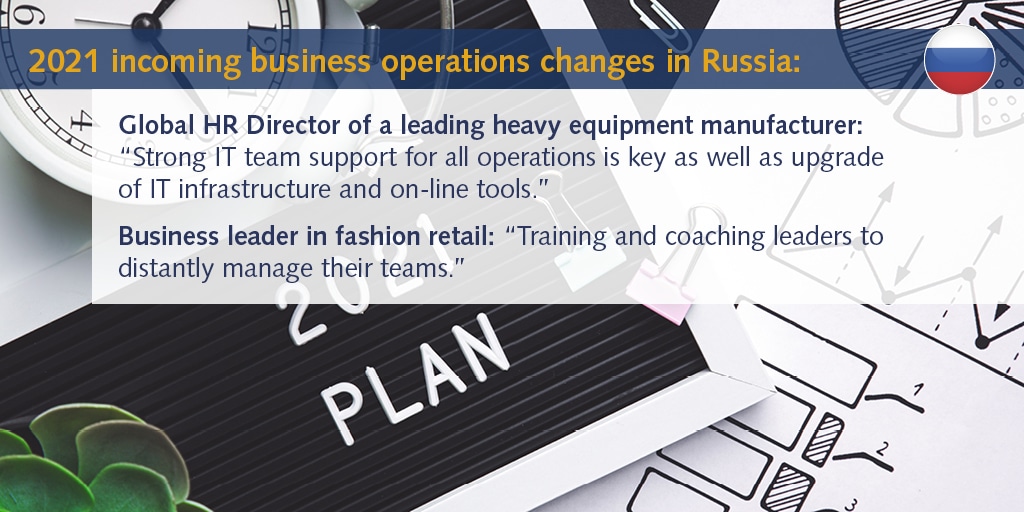The impact of Covid-19 on HR management in Russia
A Russian perspective on the pandemic
2020 will be remembered as a year of major unexpected changes, in our personal lives and in the corporate world. Companies all over the world and across most economic sectors faced challenges on a scale that has not been seen for decades. Since February, companies have been struggling to preserve the continuity and viability of their business, while at the same time guaranteeing the safety of their employees.
To measure the impact of Covid on HR setup and processes in Russia, we talked to a panel of key decision makers in Russian companies and Russia-related corporate headquarters in Europe, including CEOs, Managing Directors, CFOs, and HR Directors. This report is our summary of the most interesting responses and insights.
We should acknowledge that due to Russia’s history, individuals and companies are highly resilient, and better prepared to handle instability than people in countries not used to frequent turmoil. Because of this, Russian employers and employees alike were geared up to handle Covid-related restrictions and changes in working processes. In addition, western companies operating in Russia found it easy to quickly re-adjust their operations, as the pandemic (and subsequent lockdown) reached Russia around 4-5 weeks after it had hit Europe. Companies were therefore able to roll out measures which had already been in place in other countries, and to profit from these earlier experiences.
HR leaders have been on the front line. Most have been working to find solutions that will allow business to proceed, while protecting employee health and adapting operations to the new reality.

Depending on the economic sector, companies have been coping with multiple challenges: supply chain disruption, dramatic decreases in sales and business activity due to the closure of stores and production sites, or conversely, skyrocketing demand for certain products and services. HR leaders were given a huge increase in workload and pressure, as the expectations and stakes have been very high. In this context, HR Directors and their teams have been demonstrating the strategic reach of their function, while simultaneously becoming agents of change and drivers for transformation inside companies. While reshaping corporate operations, they are simultaneously designing the optimal operational restart for the post-Covid period.
We are aware that in some industries, Covid-19 measures have had a minimal impact. One CEO told us: “In general, from my perspective, there were no big issues which were difficult to manage. It was a ‘change the processes as usual’ situation, where a little bit more attention and time was needed to modify the processes.”
In companies with production facilities, additional challenges had to be overcome: keeping production running under new safety rules, complying with local sanitary procedures in production facilities, introducing Covid case reporting, and permanent modification of procedures. The feedback showed that home office working had been implemented where possible, as well as online communication tools and procedures.
We have been able to group our findings from the survey into five main points, which characterise the impact of the Covid crisis on HR management and decision-making:
High levels of uncertainty; the impossibility of forecasting
The main challenge for all companies was to identify, collect, communicate and implement all relevant local measures, grants and governmental initiatives as quickly as possible, in order to optimise budgeting efforts and avoid bigger losses.
A further complicating factor was the high level of uncertainty and the impossibility of forecasting, which affected all areas (sales, budgeting, financing, operations). Most managers saw a way out of these problems by seeking a balance between a proactive and a reactive approach, and the redefinition of the company’s long-term strategy.
This uncertainty has increased the pressure on management to make faster decisions, and to react more flexibly to changes. Agility and speed of reaction to change are the key to lasting success in every sector.
What made it difficult for you?
HR Director in fashion retail: “Mobility restrictions.”
GM of a major white goods producer: “Production sites and stores closed.”
Regional HR Director of a leading fashion retail player: “Bankruptcies of local/global partners (franchisees, subcontractors, providers, etc.).”
HR Director of a leading food producer: “Decrease of the consumer purchasing power.”
Business leader of a major food producer: “Changes in consumer behaviour (shift to mass-market products, online purchasing).”
Labour conditions in the future: no new normal, no going back to business as usual
After the pandemic, the business world will not return to the way it was before. There will be no “new normal” and no going back to “business as usual”. Instead, the focus will be on building agile organisations that pair greater stability with creative thinking and acting – these are not mutually exclusive! In short: more agility, more digital, more home office.
What is your view on the changes to come?
MD, French construction company: “We need more online communication and interaction with customers and employees.”
CFO, Global Packaging Company: “Big changes to workplaces, communication and working rules are ahead.”
HR Director of a major FMCG player: “Smart working as a hybrid mode of working, combining remote and office-based work setups.”
CEO, Finnish IT Service Provider in Russia: “More digitalisation in all functions will usher in a demand for new tools and skills.”
Global HR Director of a leading heavy equipment manufacturer: “Strong IT team support for all operations is key as well as upgrade of IT infrastructure and on-line tools.”
Business leader in fashion retail: “Training and coaching leaders to distantly manage their teams.”
MD French construction company: “Provide all employees working from home with the necessary devices and tools.”
3. A more important strategic role for HR
More involvement from strategic decision-makers (in additional to general management) is highly important, and this includes the Finance and HR sectors. HR roles will definitely change, and HR managers will demand greater participation in strategic decisions. New value-added data will optimise ROI and organisational agility to work out solutions that will guarantee business continuity.
HR managers will be required to: identify and retain business-critical roles, deliver a deeper understanding of all business processes in the company, and discuss and understand financial parameters in the company.
Business leaders will demand that HR managers become more involved in strategic decisions. Business leaders should measure the importance and direct impact of HR teams on the company’s business and financial results.
What needs to be done to improve strategy?
GM of a home equipment manufacturer: “In the future, HR will be considered more as a Business Partner, and more deeply involved in strategic decision-making.”
CEO, big French Construction Company: “The HR should lead the whole work-organisation design and the whole transformation process.”
VP HR of an international SW firm: "Business leaders are recognising the impact of HR related data on ROI."
To be continued



